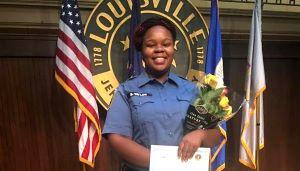In the mass protests over out-of-control and racially biased law enforcement ignited by the killing of George Floyd by Minneapolis police office Derek Chauvin, Floyd's name isn't the only one being chanted by the crowds. There's also Ahmaud Arbery, the Georgia jogger gunned down by white vigilantes. There's Rayshard Brooks, the Atlanta man shot and killed by police after falling asleep in his car in the Wendy's drive-through lane and them tussling with and fleeing from them as he sought to avoid arrest.

That's what it felt like to Ms. Taylor and her boyfriend Kenneth Walker. Although Louisville police claimed they knocked and announced their presence, they were operating with a no-knock warrant, and that account is disputed by Walker and Taylor's relatives. Walker said he and Taylor were in bed together when the door crashed in and he thought someone was breaking into their home. He said he fired in self-defense. (Here is that fraught zone where the war on drugs encounters the 2nd Amendment.)
Walker's single shot wounded one officer, who returned fire along with two other officers. Breonna Taylor was hit by at least eight bullets and died at the scene. Walker was charged with attempted murder, although those charges have now been dropped. No drugs were found at the apartment. To make matters even worse, the drug suspect the police were looking for was already in custody when the raid went down.
"They executed this innocent woman because they botched the search warrant execution," attorney Benjamin Crump, who is representing the Taylor family in a lawsuit filed over the killing told the New York Times. "They had the main person that they were trying to get in their custody, so why use a battering ram to bust her door down and then go in there and execute her?"
Outrage over the killing of Breonna Taylor quietly festered as the country hunkered down amidst the coronavirus pandemic, but when the iconic killing of George Floyd finally galvanized the streets, the pain and anger over Taylor's killing became a rallying cry not just in Louisville but across the land. And it's bringing a laser-like focus on a practice more akin to raiding terrorist hideouts in the Middle East than to serving and protecting American citizens, which in turn is leading to a renewed focus on the role of the drug war in all of this.
The war on drugs provided the impetus for no-knock raids from the beginning, and the courts were all too willing to help. The 1963 US Supreme Court case Ker v. California, which gave constitutional imprimatur to forcible police entries, was a drug case where the possibility that evidence could be destroyed carried the day for the cops. When the Supreme Court revisited and refined its no-knock doctrine in the 1990s, the impetus once again was enforcing drug prohibition.
In a case involving small-scale sales of marijuana and meth to an informant, the court ruled in 1995 in Wilson v. Arkansas that police must generally "knock and announce" before kicking in a door with a search warrant, although it allowed for exceptions as per Ker. In another small-time drug sales case, 1997's Richard v. Wisconsin, the court held that police needed to demonstrate "a reasonable suspicion" that announcing their presence before bashing in the door would be dangerous or allow for the destruction of evidence for a no-knock warrant to be permitted.

Police resort to no-knock raids has gone through the roof in recent decades, according to a 2007 study done by Peter Kraska, a professor with the School of Justice Studies at Eastern Kentucky University. He found that while no-knock or announce and enter raids happened about 1,500 times in the early 1980s, that figure skyrocketed to about 40,000 a year by the turn of the century as the drug war deepened. Kraska estimated the number of such raids at about 45,000 a year by 2010.
The raids are mainly for drugs. A 2014 ACLU report looking at SWAT teams doing no-knock raids found that 62% of them were for drugs. In at least a third of those raids, no drugs were found. In nearly another third of those raids, it's not known if any drugs were seized because police did not report that information.
And they can be deadly -- both for their targets and for the officers undertaking them. The New York Times reported three years ago that between 2010 and 2016 alone, at least 13 police officers lost their lives on such raids, but so did more than seven times as many civilians. The Times put the civilian death toll at 94, with many hundreds more injured. They include such total innocents as 19-month-old "Baby Bou Bou" Bounkam Phonesavanh, who was severely burned by a flash bang grenade thrown by a Georgia SWAT officer in a 2015 no-knock raid.
But now, with the killing of Breonna Taylor in the context of mass mobilizations against police brutality and racial bias, no-knock raids are being challenged like never before. The Democratic congressional response to the upheaval in the streets, the Justice in Policing Act, directly targets no-knock raids. As the Democrats put it, the bill "[b]ans no-knock warrants in drug cases at the federal level and conditions law enforcement funding for state and local governments banning no-knock warrants at the local and state level." (Advocates are calling for amendments to strengthen the bill -- and then passage.)
Kentucky's libertarian-leaning US Senator Rand Paul (R) met with Taylor's family and then introduced the Breonna Taylor Act "to prohibit no-knock warrants." The bill would mandate that federal law enforcement officers must announce their presence and purpose before executing a search warrant and it would condition federal aid to law enforcement agencies to ensure they follow the same rules.
"After talking with Breonna Taylor's family, I've come to the conclusion that it's long past time to get rid of no-knock warrants. This bill will effectively end no-knock raids in the United States," said Paul.
Meanwhile, even Paul's Republican colleagues are climbing on the no no-knock bandwagon, although to a more limited degree than the Democrats. The just introduced Justice Act, largely crafted by the GOP's sole black senator, Tim Scott of South Carolina, wouldn't ban no-knock raids, but would increase federal reporting requirements for no-knock raids and use of force. It would also increase penalties for false police reports.
It's unclear whether any of these bills will pass or whether compromise legislation will emerge, and it's unclear just how strong any language on no-knock raids will end up being. But what is clear is that Congress finally has the issue squarely in its sights.
But law enforcement is largely a state and local matter, and it's going to be up to state legislatures and governors and city councils and mayors to address the issue at the local level. Louisville has already done so. With protests raging in the streets, the city council early this month moved unanimously to ban no-knock raids. Only two states -- Florida and Oregon -- have banned no-knock raids, but that should be about to change, given the tumult in the streets over police misconduct. It should have happened a long time ago.
This work by StoptheDrugWar.org is licensed under Creative Commons Attribution-ShareAlike 4.0 International
Comments
Trampling on citizens rights
thanks as always for this
thanks as always for this good, credible reporting, phil smith. american police have always had too much power and too little accountability. but that's to be expected from servants of an oppressive ruling class in a society of immense inequality and injustice.
Ya, they will give a knock
Ya, they will give a knock before breaking down the door and shooting and murdering your wife, children and dog. This will be known as the Democrat approach to the drug war.
Get a grip, organize oppose the Republicans and Democrats drug war against us. Biden is a war criminall = Iraq + Drug war = double war criminal.
Add new comment